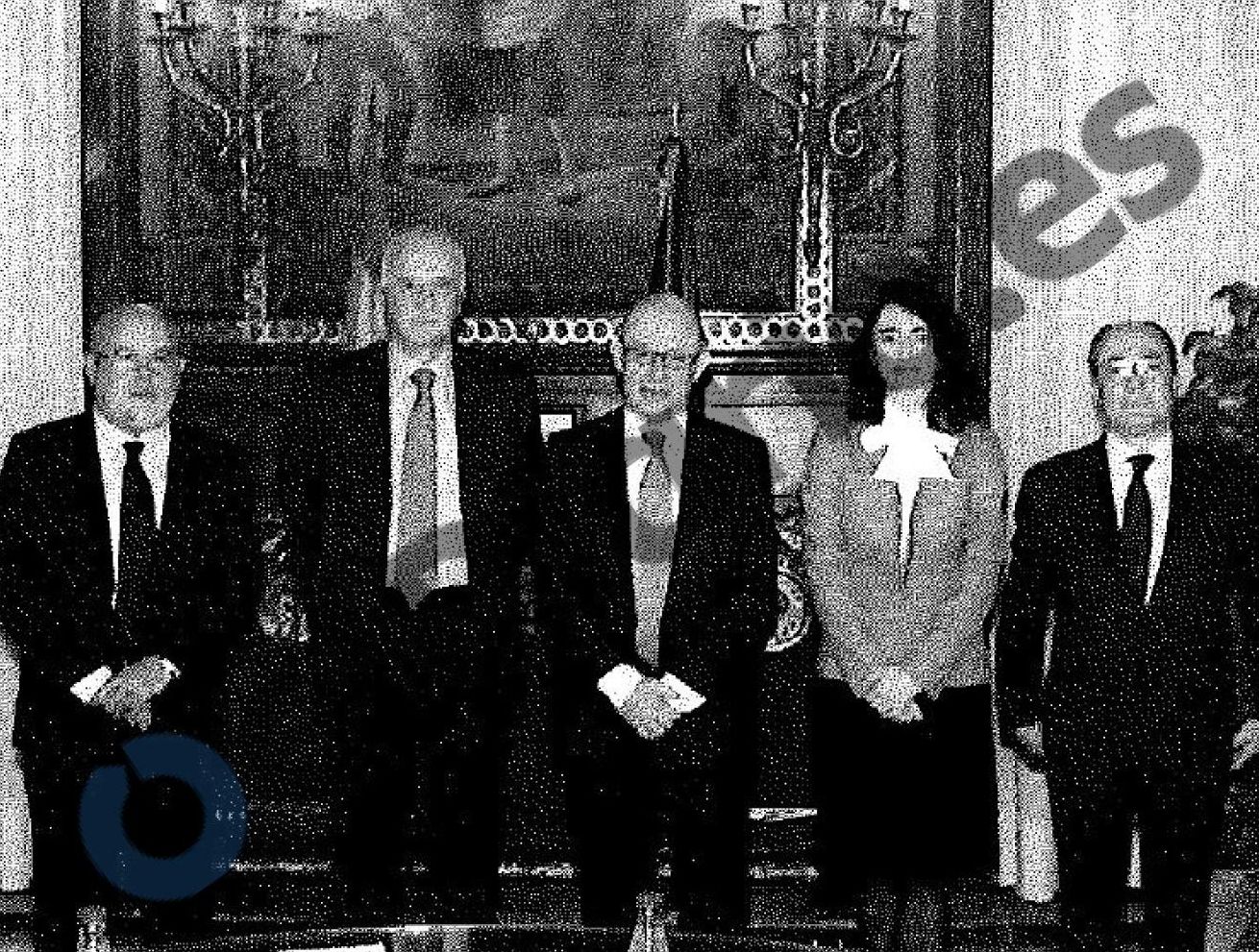“I prefer that this type of valuation is not left in writing on whether the tax increase must be gradual or fast, these papers are loaded by the devil.” Who writes this email on February 23, 2014 is Miguel Ferre, then Secretary of State for the Treasury in the Ministry directed by Cristóbal Montoro. At that time, a large -scale tax reform was being cooking, from which the gas companies that paid the economic team, the office founded by the minister, would benefit to defend their interests in the ministry. There was no rise (neither paultina nor fast) but tax reduction for these companies.
The judge of Tarragona Rubén Rus, who has investigated the case for seven years and attributes a plurality of crimes to Montoro and his command cadres of the ministry and the private office he founded, has in the focus two fiscal sales that the Association of Industrial and Medicinal Gas Manufacturers (AFGIM) in 2014 and 2018 after paying to the economic equipment. The magistrate figure at 779,705 euros the payments of five companies (Air Liquide, Abelló, Messer, Praxair and Metal Carbides) and of the employer itself to the Office of the former Minister between 2011 and 2019.
Specifically, Afgim paid in March 2014 the amount of 270,000 euros plus VAT to the office economic team in exchange for a 12 -page report, half of which were prepared with the information provided by the employer itself. According to investigators' calculations, savings after legislative modification was about 4.7 million euros.
The summary of the case, to which Eldiario.es has had access, confirms that the employer gas achieved its objectives thanks to the direct contact that economic team had with the Ministry, which after the victory of the PP in 2011 several of its members were incorporated. The investigations point out that Afgim members had knowledge of the state of the legislative processes before Congress, and that they could even transfer the concrete writing of tax changes to the ministry.
The investigation extends those same practices to sectors such as the game (with Codere as a prominent client), the renewables (with abengocia, solery or Gamesa, among others) or the lines of Plades (Ence), which also paid economic equipment in search of favorable legal modifications. But it all started with gas.
“The ministry worries”
Afgim had an objective in 2013: that the transposition of a European directive involved a 85% reduction in the liquidable base of the Electricity Tax. The efforts made by the PP parliamentary group were not successful, so at the end of the year the entity decided to resort to an office “with access to the ministry.” Thus began the relationship with economic team.
The fiscal reduction that was not achieved the previous year was achieved in 2014 in just three months. The seizure of thousands of hacienda emails and companies has allowed the Mossos d'Esquadra to set two key meetings to explain the tax reduction: on March 4 and April 21, 2014, AFGIM representatives met, according to the investigation, with the then minister and the then Secretary of the Treasury, Cristóbal Montoro and Miguel Ferre.

After this last meeting, one of the gasist managers pointed out in an email that Ferre “commented that they would appreciate our help regarding the drafting of the modification of law, that is, the writing of the BOE.” In June 2014, the draft law was approved “contemplating the interests of gasists,” conclude the Mossos d'Esquadra.
The Mossos d'Esquadra report also remarks that the high positions of the administration were aware that any change in the law “could economically affect the collection of the administration via taxes.” This follows, according to the Catalan Police, from the mail that ferres the then general director of Taxes, Diego Martín-Abril. It was the response to a previous email that included a proposal to reform the tax system of energy taxes (gas and electricity) and environmental that could not be read by the Mossos, but that in several emails it is concluded that it is an issue to be addressed “with total confidentiality”.
In May 2014, in another post exchange, the cabinet director of the Secretary of State for the Treasury, José María Buenaventura, explained to Martín-Abril that he was committed to having “benefits in the partial exemption applicable to gases, where appropriate, Padreras”, but, at the same time, he warned that the “extension of metallurgical sector criteria” would require meetings with the Ministry of Industry. For the Mossos, this shows “the intention of the administration to limit the law to a specific sector”, that of gas.
An impression that one of the gasist managers shared, which after a meeting with the Treasury in April told other entrepreneurs “the impression that the ministry is concerned that if the law is modified (…) a window is opened by which other sectors can be cast.”
The conclusion of the Mossos is that the Treasury dome “preferred to ignore, and even hide” the tax impact of the reforms, which only in 2015 caused that 89 million euros would stop entering, and that they had to be amended in 2017 to reverse the tax hole.
“Get in touch with EE”
After the success of 2014, the AFGIM Board of Directors decided to hire economic team. In this second part, the intended (and obtained) change consisted of a modification of the epigraphs of the economic activities tax that allowed companies to obtain a tax reduction. The money of these taxes was partly destined for the municipalities where companies have gas manufacturing plants.
Throughout 2015 and 2016, the AFGIM had resorted to the consultant Ernst & Young to act from Lobby to the Ministry and achieve tax reduction. Despite the numerous meetings and efforts, which included an encounter with the deputy director of Local Taxes of the Ministry, Óscar del Amo (ceased this Friday), the objective was not achieved. The Mossos d'Esquadra emphasize that the consultant returned 18,150 euros to the employer by not achieving her goal.
The Secretary General of Afgim, Carlos Romero, expressed his unease in an email sent in October 2016 to his associates and the Ernst & Young partner in charge of the interlocution with the ministry. From the master, according to Romero's version, he had transferred him in telephone conversation that there was no “normative vehicle” for the desired fiscal reduction in the face of political uncertainty to approve the budgets. “Unfortunately, that's all,” he adds.
As stated in the AFGIM Board of December 2016, the last meeting between representatives of the consultant, the employer and the master, held a month earlier, had also ended “without success”. The gas companies then decided to “come into contact in the US to have another open option in case it is necessary,” they reflected themselves in the minutes of their Board of Directors.
A month and a half later, in February 2017, Romero presents to his associates the offer of economic team. As transferred by the Secretary General of Afgim, the former Minister's office had transferred that “there were no great possibilities” to obtain the tax reduction, “but that they would be attentive to the possibilities that could be offered.” In return, the buffet claimed 60,000 euros for a “first phase of the works.”
The president of the Gasista Association claimed to “leave the premium for economic team in case of success of the” second phase “more, but the office considered more appropriate” to profile and clarify the possible contents “throughout the first year. Finally, the gas companies agreed to collaborate with economic team with, at Romero's proposal, “the same criteria that were used when the analysis and study of the incidence of the electrical tax was managed” in 2014.
Economic team entry accelerates changes that until then seemed impossible. In September 2017, the partner of the Office founded by Montoro, Manuel de Vicente Tutor (who had worked in the Tax Agency in the past), considers the General State Budgets the best option for the fiscal reduction (a route that the deputy director of Local Taxes of the Ministry had closed the year before the companies and that was the prelude to the hiring of economic equipment).
The evolution of the works is found in the AFGIM Board Act of October 2017. This telephone call infers, according to the Catalan police, that it was “AFGim itself who made and sent the proposal of tax reduction.
The Mossos also highlight that this act is six months prior to the first draft of the General State Budgets, so Afgim “knew firsthand the drafted of the desired modification” of the tax of economic activities half a year before Congress. The reason: it was the AFGIM itself that wrote the changes thanks “to the support of who had the capacity to influence the subdirection: economic team.”
This is confirmed in the exchange of emails between Vicente Tutor and the Afgim: the text that finally approves “exactly”, the Mossos stand out, with the reduction of the IAE approved in the 2018 Budgets and which remains in force today.
The Mossos d'Esquadra calculate the benefit that the legislative improvement obtained in 2018 for one of the companies associated with Afgim. According to the calculations of the Catalan police, Metal Carbides obtained an “annual variation of the tax burden” in the IAE of 438,276.50 euros. An example, the Mossos conclude, that the legislative change meant “a impairment for public coffers.”






